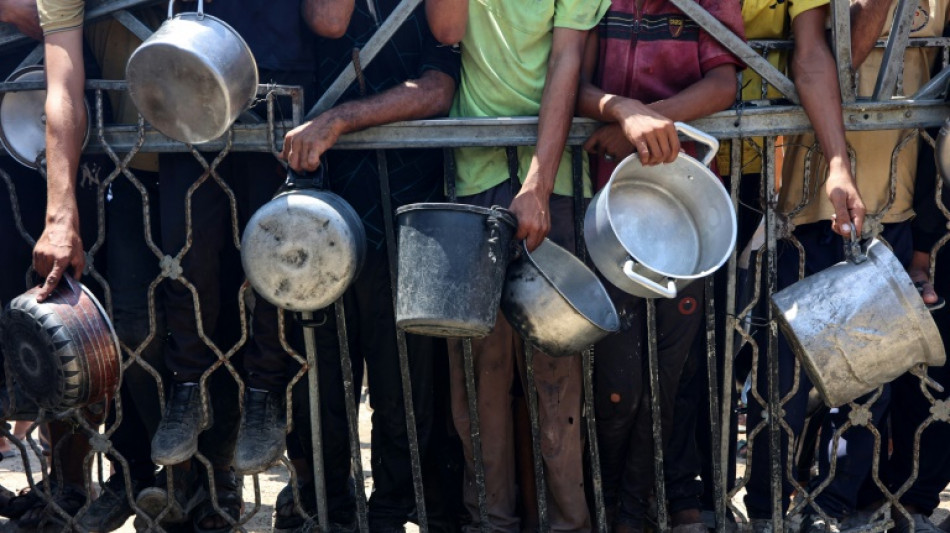
RBGPF
0.0000

Palestinian-Canadian Faiza Najjar was able to leave Gaza last year, but could not bring her four adult daughters with her. She watched from a distance as food shortages in the territory worsened.
From Canada, where she lives with her six other children, Najjar pursued a months-long effort to get those she had left out of Gaza.
She finally embraced her daughters and seven grandchildren when they arrived at Toronto's airport last month.
But when clips of the emotional reunion were posted on social media, pro-Israeli accounts mocked her physical appearance saying it disproved claims of starvation in Gaza.
"As a mother it just destroyed me," Najjar, 50, told AFP.
Najjar did not claim that she went hungry while in Gaza.
But as recently as this past weekend a post viewed more than 300,000 times across multiple platforms ridiculed her, erroneously implying she had just left Gaza.
"Did you see what that woman looked like?" the poster said, pointing out Najjar does not look undernourished.
United Nations agencies have warned that famine was unfolding in Gaza, with Israel severely restricting the entry of aid. Images of sick and emaciated Palestinian children have drawn international outrage.
The allegation has been denied by Israel. "There is no starvation in Gaza," Prime Minister Benjamin Netanyahu said last month.
The ridicule Najjar faced is part of a broader trend.
Israeli anchors on the country's right-wing Channel 14 -- sometimes described as the Hebrew Fox News -- have laughed at "obese" mothers, alleging they steal their children's food.
For Najjar, the fact that her family's reunion got caught up in a misinformation campaign was devastating.
"After all the suffering, and losing everything, and nearly dying, some people still had the heart to mock them," she said, referring to her family.
"My daughters lived there and their children went to sleep hungry...with bombs outside their tents," Najjar said.
Pro-Israeli commentators online also focused on her grandchildren’s apparently healthy appearance.
Najjar told AFP they received medical treatment, including renourishment, at a hospital in Jordan before flying to Canada.
- Deflecting attention -
Mert Can Bayar, a postdoctoral fellow at the Center for an Informed Public at the University of Washington, said the posts targeting Najjar are "just one little piece" of a misleading online narrative.
Toronto's Mayor Olivia Chow removed a video she had posted on Instagram in which she welcomed arriving Palestinians because of abusive comments directed at the family.
Comments on Chow's video also cited the family's physical appearance to broadly dismiss claims of starvation in Gaza.
X's chatbot Grok also misidentified a 2025 AFP photo of an emaciated child in Gaza, incorrectly saying it was taken in Yemen seven years ago, fuelling further claims that reports of starvation in Gaza have been fabricated.
Valerie Wirtschafter, a fellow at the Brookings Institution think-tank, said the claims were reminiscent of falsehoods that emerged weeks into the war alleging Palestinians had posed as so-called crisis actors and staged their injuries.
Wirtschafter said the hoax narrative "deflects from the real humanitarian harms that are happening right now."
- 'Denial' -
Israel's offensive has killed at least 61,430 Palestinians, according to Gaza's health ministry, figures the United Nations deems reliable.
Hamas's October 2023 attack on Israel, which triggered the war, resulted in the deaths of 1,219 people, according to an AFP tally based on official figures. Forty-nine of the 251 hostages taken by Hamas are still held in Gaza, including 27 the Israeli military says are dead.
When Najjar left Gaza last year, her daughters -- all in their 20s -- did not have Canadian citizenship.
With the family separated, she lived with crippling fear at the prospect of receiving word that they had been killed.
While her daughters now have citizenship and are in Canada with their children, her sons-in-law remain in Gaza, where the UN's Integrated Food Security Phase Classification says "widespread starvation, malnutrition, and disease are driving a rise in hunger-related deaths."
"I just want the world to know the crisis is real," Najjar told AFP. "Denial is deadly."
H.Vesely--TPP